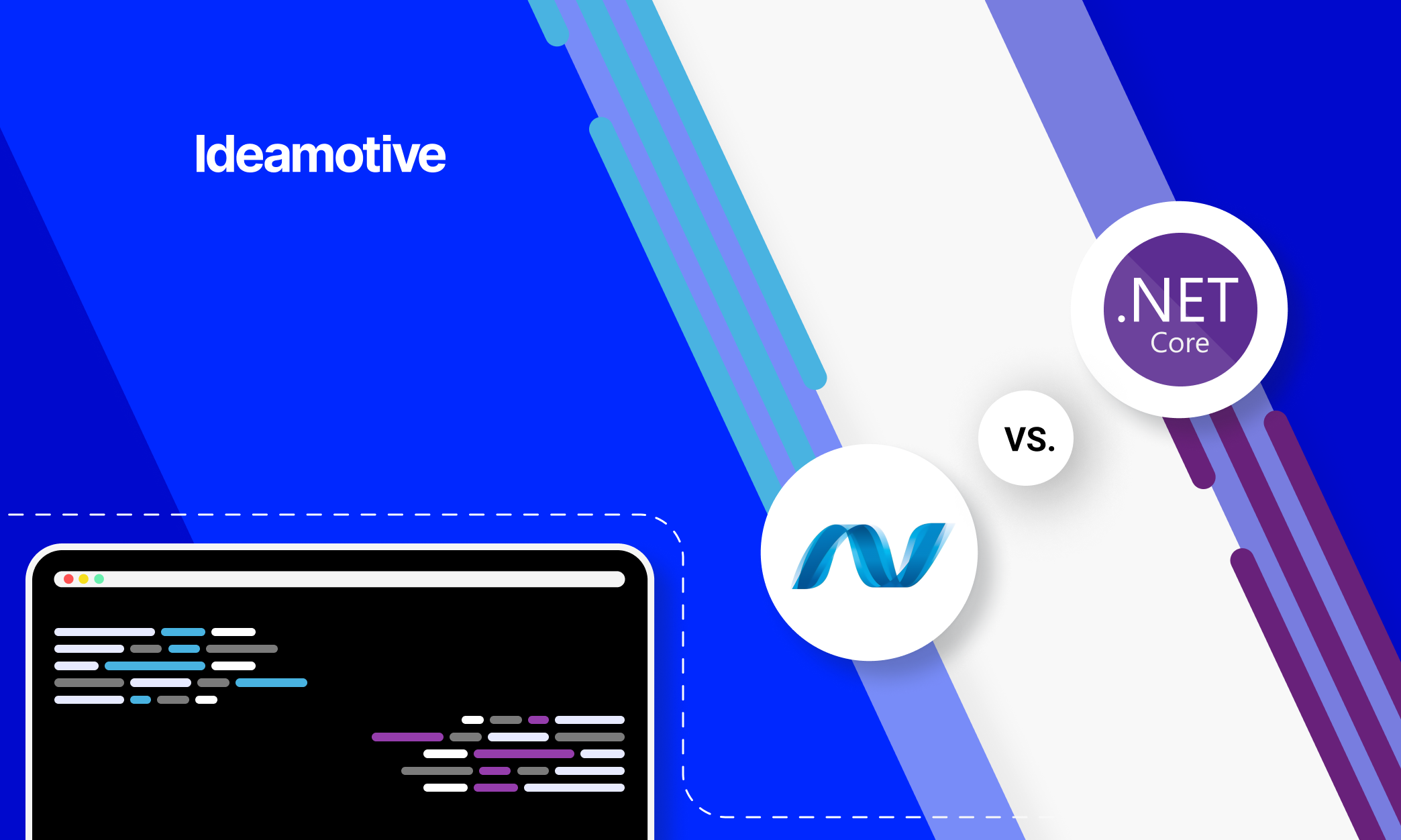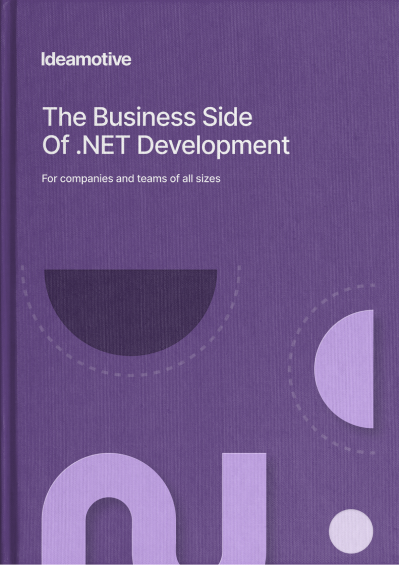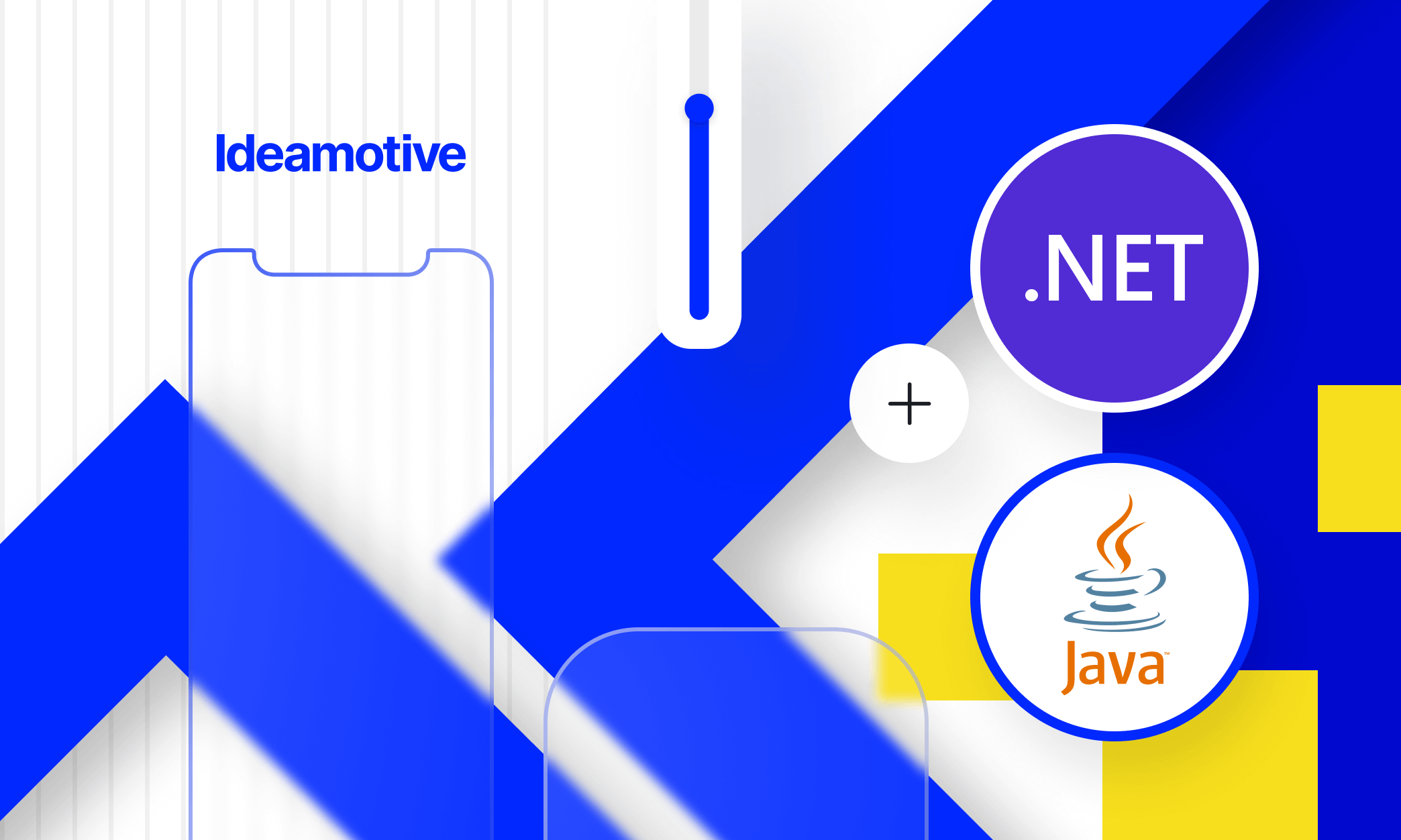.NET Core vs. .NET Framework, which is suitable for my project? This question is frequently thrown around in conversations about the capabilities of Microsoft’s enterprise-focused frameworks.
The .NET Core vs. .NET Framework debate is becoming increasingly popular as more and more companies require cross-platform solutions that provide flexibility, improved performance, and compatibility with multiple programming languages. (For example, C# and Java.)
However, let’s get one thing straight: .NET Core is not a replacement for .NET Framework. The distinction between the two lies in how they operate and how big their code bases are.
So the big question is, .NET Core vs. .NET Framework: which is better? In this article, we will outline and compare the two, so you can make a more informed decision about which platform best caters to your project needs. Let’s dive in.
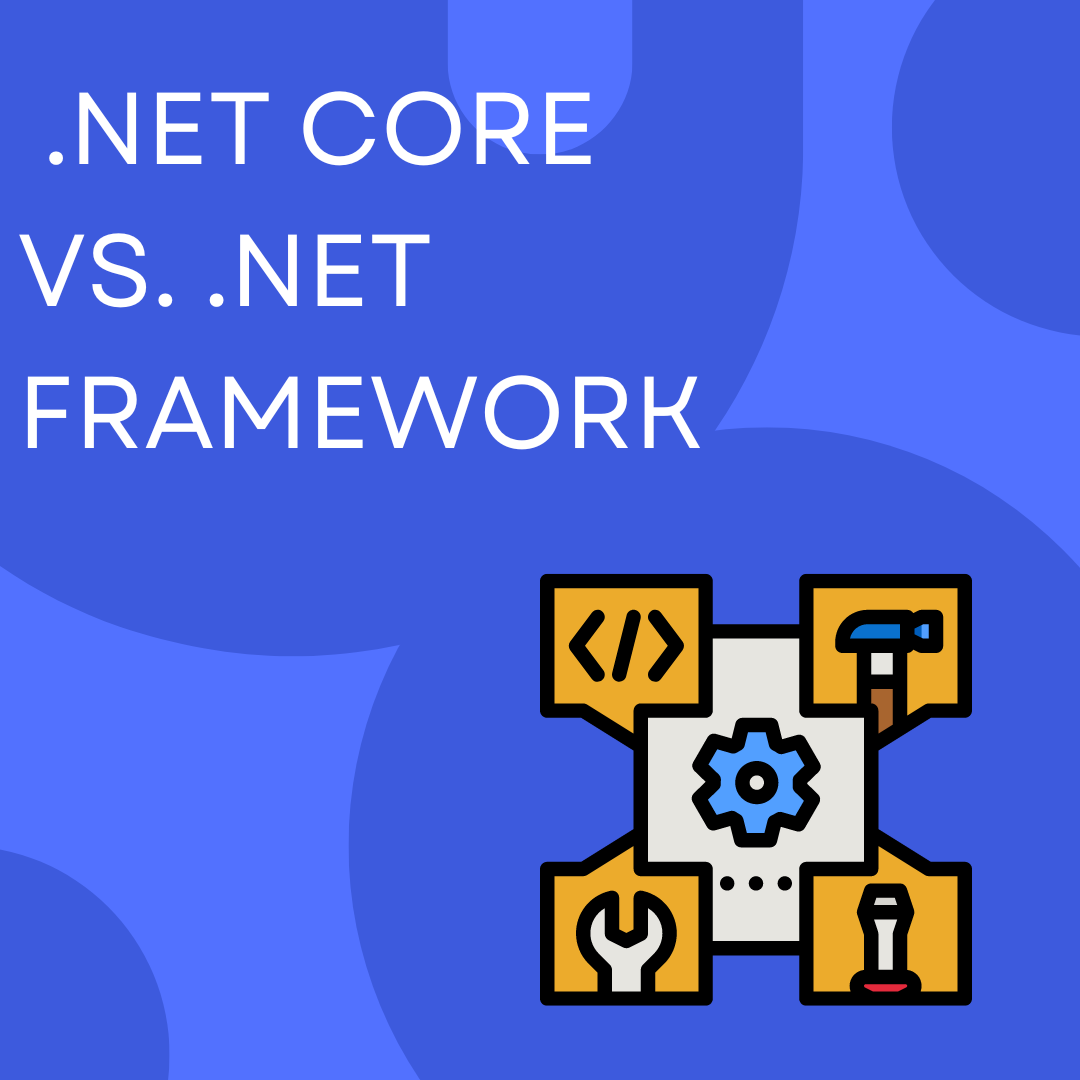
What Is .NET Core?
.NET Core is a free, open-source, cross-platform framework for building modern applications, including web, mobile, desktop, gaming, IoT, cloud, and microservices.
It is designed to be flexible, lightweight, and modular, allowing you to choose the components you need for your specific application.
One of the key features of .NET Core is its ability to run on multiple operating systems, including Windows, Linux, and macOS. Also, it supports numerous languages, including C#, F#, and VB.NET.
.NET Core is built on the .NET Standard, a common set of APIs across all .NET implementations. The way it’s built enables developers to create libraries they can share across different .NET platforms, including .NET Framework, .NET Core, and Xamarin.
This Framework is suitable for many application on types, including web applications, microservices, cloud-based applications, and mobile backends. It also provides powerful tools and libraries for building modern applications, including containers, machine learning, and AI support.
The Components Of .NET Core
.NET Core is a powerful and flexible framework helpful in creating a wide range of applications for various platforms and environments.
It consists of several components that work together to provide a complete development platform for building modern applications. Here are some of the components of the .NET core platform.
.NET Runtime: This is the core component of .NET Core, responsible for executing .NET applications. It consists of a garbage collector, a just-in-time (JIT) compiler, and various runtime services.
.NET Base Class Libraries (BCL): These are a set of libraries that provide standard functionality for .NET applications, including support for file I/O, networking, security, and other common tasks.
.NET Standard: This is a common set of APIs across all .NET implementations, including .NET Framework, .NET Core, and Xamarin. It enables developers to build libraries shareable across different .NET platforms.
ASP.NET Core: This web application framework allows developers to build modern, cloud-based web applications using .NET Core. It includes support for building web APIs, serverless applications, and single-page applications (SPAs).
Entity Framework Core: This object-relational mapping (ORM) tool enables developers to work with databases using .NET objects. It supports many database engines, including SQL Server, MySQL, and PostgreSQL.
.NET Global Tool: This command-line tool enables developers to install and manage .NET Core tools and libraries from the command line.
These are just a few of the main components of .NET Core. Many other tools and libraries are available for building modern applications with .NET Core, including containers, machine learning, and AI support.
The Advantages Of Using .NET Core
Here are some of the several advantages of using .NET Core for building modern applications:
- NET Core can run on multiple operating systems, including Windows, Linux, and macOS, making it a good choice for building applications that need to run on various platforms.
- It is an open-source framework, meaning everyone has access to review and contribute to the source code. This makes it easier for developers to understand how the Framework works and allows them to contribute to its development and evolution.
- It is modular and lightweight, allowing developers to choose the components they need for their applications.
- .NET Core is optimized for high performance, focusing on fast startup times and low memory overhead.
- It includes built-in support for containers, making deploying applications in containerized environments easier.
- The Framework has a robust ecosystem of tools and libraries, including support for building web applications, microservices, and cloud-based applications.
- Supports multiple programming languages, including C#, F#, and VB.NET, giving developers a wide range of options for building applications.
The Disadvantages Associated With .NET Core
While .NET Core has many pros, it also has some cons. Here are some of the disadvantages of .Net Core:
- .NET Core is not fully backward compatible with .NET Framework, so existing .NET Framework applications may need to be modified or rewritten to run on .NET Core.
- Some libraries and frameworks available for .NET Framework may not be available for .NET Core or have equivalent functionality.
- It introduces new technologies and approaches that may require developers to learn new skills and techniques.
- It may require more setup and configuration than .NET Framework, especially for developers who are used to working with the latter.
- It is a modern, cross-platform framework that focuses on building modern, cloud-based applications. As such, it may have less support for legacy systems and technologies.
When To Use .NET Core For Your Projects
.NET Core is a good choice for building modern applications that you need to meet the following requirements:
- If you need to develop an application that runs on multiple operating systems, such as Windows, Linux, and macOS.
- If you’re building modern, cloud-based applications, including microservices and serverless applications.
- If you need to deploy your application in a containerized environment.
- If you prefer to use open-source technologies, or if you want to review and contribute to the source code of the Framework you are using.
- Suppose you need to deploy a lightweight, modular application. It allows you to choose specific components for your application.
Ultimately, when to use.NET Core for your application will depend on your specific requirements and the needs of your project.
What Projects Is .Net Core Suitable For Developing?
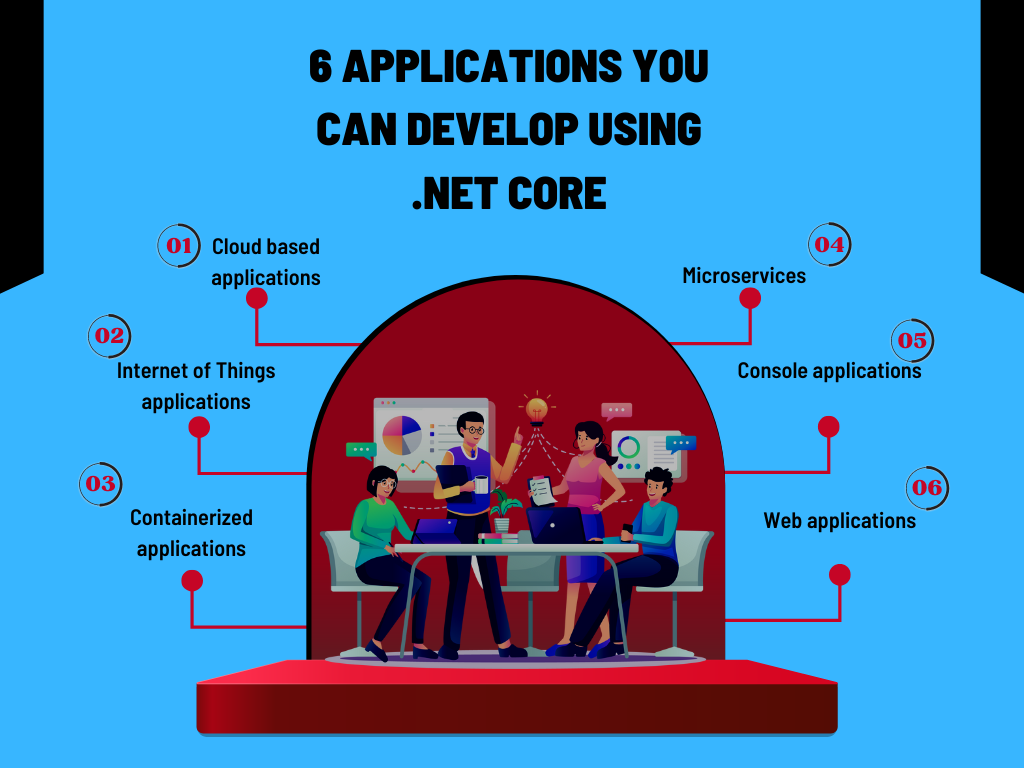
.NET Core is a modern, cross-platform, open-source version of .NET, and it is suitable for building a wide range of applications. Some examples of applications well-suited to .NET Core include:
Cloud-based applications: It is optimized for building modern, cloud-based applications, including microservices, serverless, and cloud-native applications.
Web applications: .NET Core includes ASP.NET Core, a web application framework that enables developers to build modern, cloud-based web applications using .NET Core.
Mobile applications: suitable for building cross-platform mobile applications using tools such as Xamarin, which enables developers to build native Android, iOS, and Windows applications using .NET Core.
Microservices: .NET Core is well-suited for building microservices and other distributed systems.
Console applications: You can use .NET Core to build command-line tools and utilities.
Internet of Things (IoT) applications: .NET Core can build IoT applications for many devices, including embedded devices, sensors, and gateways.
Containerized applications: .NET Core has built-in support for containers, making deploying applications in containerized environments easier for developers.
These are just a few examples well-suited to .NET Core. .NET Core is a versatile and powerful platform ideal for various applications for different platforms and environments.
Now let’s move on to the .NET framework.
What Is .NET Framework?
.NET Framework is a software development platform from Microsoft that runs primarily on Microsoft Windows.
It provides a runtime environment for executing .NET applications and a set of libraries for building various applications, including mobile, mobile, desktop, gaming, IoT, and cloud applications.
The .NET Framework consists of the following:
- Common language runtime (CLR), which is responsible for executing .NET applications
- Set of base class libraries (BCL), which provide a wide range of functionality for .NET applications, including support for file I/O, networking, security, and other common tasks.
Furthermore, it supports multiple programming languages, including C#, F#, and VB.NET. It also includes many frameworks and tools for building applications, including ASP.NET for web development, Windows Forms for desktop applications, and WPF for building modern desktop applications.
Additionally, the Framework runs on the Windows operating system. However, some implementations of .NET, such as Mono and DotGNU, are available for other platforms. It is a mature and widely used platform for building various applications.
The Advantages of Using .NET Framework
.NET Framework is a mature and widely used platform for building a wide range of applications, and it has several advantages, such as:
- It’s a well-established platform with a large user base, making it easy to find support and resources for building applications.
- .NET Framework offers a wide range of libraries and tools for building applications, including support for web development, desktop applications, and mobile applications.
- The .NET Framework supports multiple programming languages, including C#, F#, and VB.NET, giving developers a wide range of options for building applications.
- .NET Framework has strong integration with the Windows operating system, making it a good choice for building applications that need to take advantage of specific Windows features or APIs.
- It has existed for a long time, with a large user base, so many existing applications and libraries are built on it. Therefore it’s easier to integrate new applications with existing systems.
The Disadvantages Associated With .NET Framework
Here are some potential disadvantages to consider when using .NET Framework:
- It is primarily designed to run on Windows operating systems, so it may not be a good choice for building applications that need to run on other platforms.
- It is not open source.
- .NET Framework is an extensive, monolithic framework with many libraries and tools, making deployment problematic.
- It is not as well-suited to building modern, cloud-based applications as .NET Core, which is optimized for building such applications.
- It doesn’t have built-in support for containers makes deploying applications in containerized environments harder.
- It’s no longer actively developed by Microsoft.
When To Use .NET Framework For Your Projects
.NET Framework is a mature and widely used platform for building a wide range of applications, and it is ideal for building applications that need to meet the following requirements:
Traditional desktop or server-based applications: .NET Framework is a well-established platform for building such applications.
Strong integration with Windows: If your application needs to take advantage of specific Windows features or APIs, .NET Framework has strong integration with the Windows operating system.
Legacy systems support: .NET Framework support this type of system, as it has a long history and a large user base.
Enterprise support: .NET Framework is supported by Microsoft. It is used by many enterprises, making it a good choice for building business-critical applications.
Also, you can use .NET Framework for your project if any of its requirements fall into the categories itemized below:
- If you need access to a wide range of libraries and tools. .NET Framework offers many libraries and tools for building applications.
- If you are building an application that needs to integrate with existing systems or libraries built on .NET Framework.
What Projects Is .NET Framework Suitable For Developing?
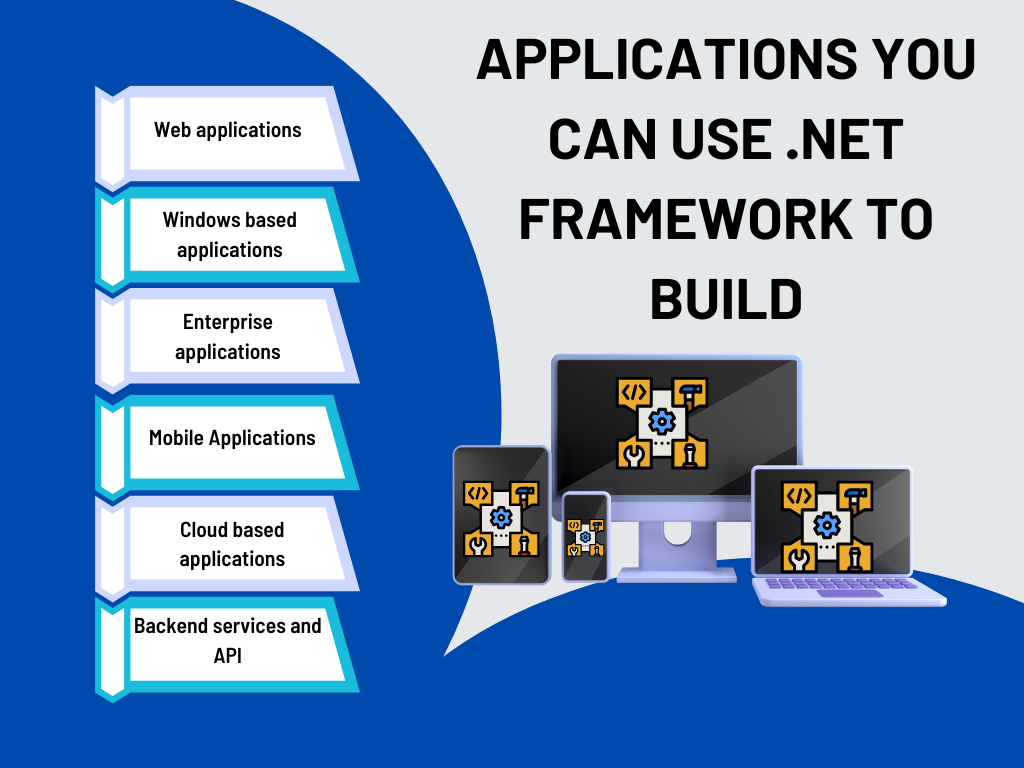
Some examples of the types of applications that are well-suited to the .NET Framework include:
- Web applications: .NET Framework includes ASP.NET, a web application framework that enables developers to build traditional web applications using .NET Framework.
- Windows-based applications: .NET Framework is used to build Windows-based applications, including desktop applications, server applications, and mobile apps for Windows devices.
- Desktop applications: .NET Framework can be used to build traditional desktop applications for Windows using tools such as Windows Forms and WPF.
- Mobile applications: .NET Framework can be used to build applications for Windows Phone using tools such as Xamarin.
- Cloud-based applications: .NET Framework can be used to build cloud-based applications deployed to Azure or other cloud platforms.
- Enterprise applications: Many large organizations use .NET Framework to build mission-critical enterprise applications.
- Games: .NET Framework can be used to build games using tools such as Unity.
- Backend services and APIs: .NET Framework is a good choice for building backend services and APIs because it provides a rich set of tools and libraries that make it easy to build scalable, reliable, and maintainable systems.
The Major Differences Between .NET Core and .NET Framework?
Several key differences exist between .NET Core and .NET Framework, and I will highlight them below:
Type of Framework: .NET Core is a cross-platform and open-source framework, while the .NET Framework is a Windows-based framework.
.NET Core vs. .NET Framework Performance: .NET Core has a smaller runtime and better performance than the .NET Framework.
.NET Core vs. .NET Framework Speed: .NET Core is designed to be modular and lightweight, while the .NET Framework is a larger and more feature-rich framework.
Programming language support: .NET Core supports multiple programming languages, while the .NET Framework primarily supports C# and VB.NET.
Detailed Comparison Between .NET Core And .NET Framework
Now, let’s compare .NET Core and .NET framework based on platform support, language support, modularity, performance, open source, compatibility, and deployment.
Platform support: .NET Core is a cross-platform framework that runs on multiple operating systems, including Windows, Linux, and macOS. At the same time, .NET Framework runs on only Windows operating systems.
Open source: .NET Core is an open-source framework, meaning the source code is available for anyone to review and contribute. On the other hand, .NET Framework is not open source. However, some framework parts are available under a shared source license.
Language support: Both .NET Core and .NET Framework support multiple programming languages, including C#, F#, and VB.NET.
However, .NET Core has a more extensive set of supported languages, including support for languages that run on the CLR, such as IronPython and IronRuby.
Modularity: .NET Core is designed to be flexible and modular, allowing developers to choose only the components they need for their specific application.
In contrast, .NET Framework is a monolithic framework that includes many features, even if you don’t need them all.
Performance: .NET Core is generally faster and more lightweight than .NET Framework, thanks to its modular design and modern runtime.
Deployment: The .NET Core design is lightweight and modular, allowing developers to choose the specific components they need for their applications. Its features make deploying applications built with .NET Core easier, as you don’t need to include the entire Framework with your application.
.NET Framework, on the other hand, is a larger, monolithic framework comprising a wide range of libraries and tools.
Compatibility: .NET Core is not fully compatible with the .NET Framework, as it includes different APIs and libraries. However, .NET Core is built on the .NET Standard, a common set of APIs across all .NET implementations, including .NET Framework, .NET Core, and Xamarin, which enables developers to build libraries that are shareable across different .NET platforms.
In summary, .NET Core is a modern, cross-platform, open-source version of .NET that is focused on creating modern, cloud-based applications. In contrast, .NET Framework is a mature, Windows by-based platform for building a wide range of traditional desktop and server-based applications.
|
Feature
|
.NET Core
|
.NET Framework
|
|
Platform support
|
Windows, Linux, macOS
|
Windows
|
|
Open source
|
Yes
|
No (some parts are available under a shared source license)
|
|
Language support
|
C#, F#, VB.NET, plus other languages that run on top of the CLR (such as IronPython and IronRuby)
|
C#, F#, VB.NET
|
|
Deployment
|
Lightweight and modular, allowing developers to choose specific components for their application
|
Larger, monolithic Framework with a wide range of libraries and tools
|
|
Compatibility
|
Not fully compatible with .NET Framework, but built on top of the .NET Standard, a set of APIs that are common across all .NET implementations
|
Not compatible with .NET Core
|
|
Target audience
|
Developers making modern, cloud-based applications
|
Developers building traditional desktop and server-based applications
|
|
Development status
|
Actively developed and supported by Microsoft
|
No longer actively developed by Microsoft
|
Final Thoughts
In conclusion, .NET Core and .NET Framework are both frameworks for developing and running applications on the Microsoft platform. However, some distinctions between them make each better suited for different types of projects.
.NET Framework is a legacy framework that has been around for a longer time and has a more comprehensive set of features and libraries.
It is also generally easier to use for developers who are already familiar with the .NET ecosystem. However, it is only supported on Windows and does not have the cross-platform capabilities of .NET Core.
On the other hand, .NET Core is a modern, open-source framework designed to be cross-platform and lightweight.
It is a good choice for building cloud-based applications or projects requiring high flexibility and portability. However, it has a smaller set of features and libraries than the .NET Framework, and developers may need additional work to learn and use it effectively.
Both frameworks have their strengths and limitations, and evaluating the best fit for the needs of your project is essential.
Ultimately, the choice between .NET Core and .NET Framework will depend on your project’s specific requirements and constraints. And you can hire competent and properly vetted .NET developers to help you with your project from the Ideamotive marketplace.
